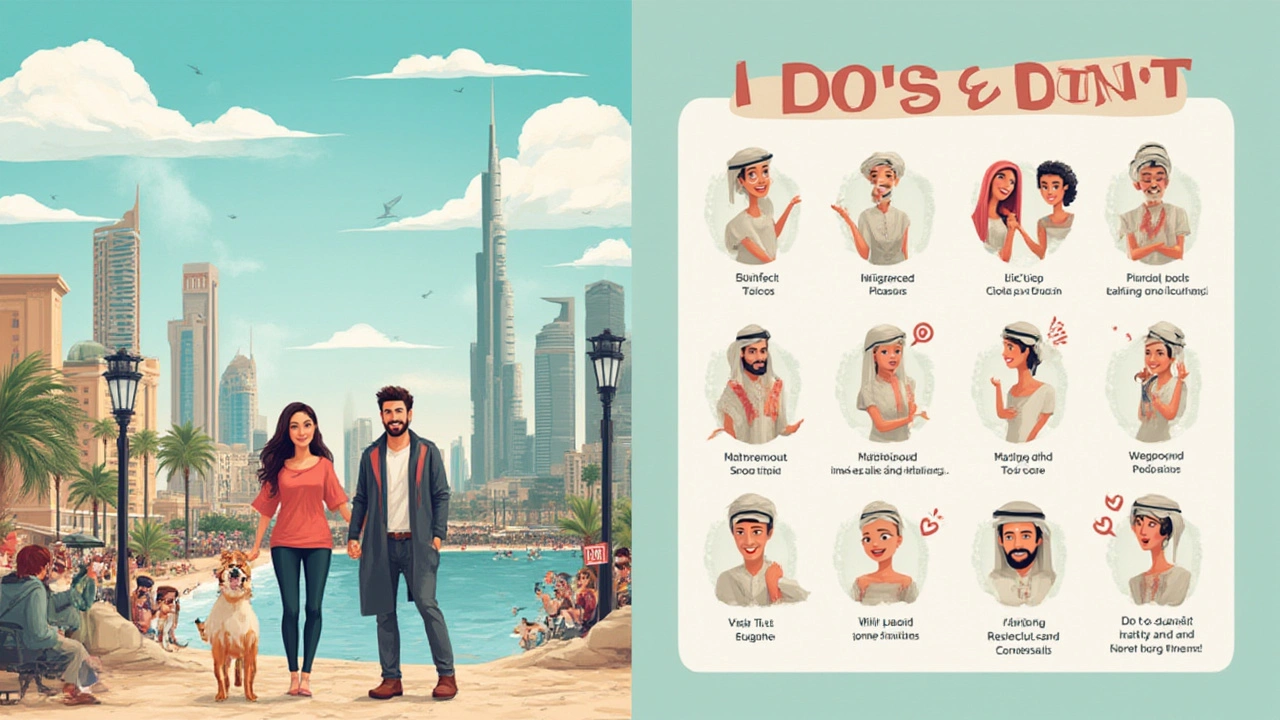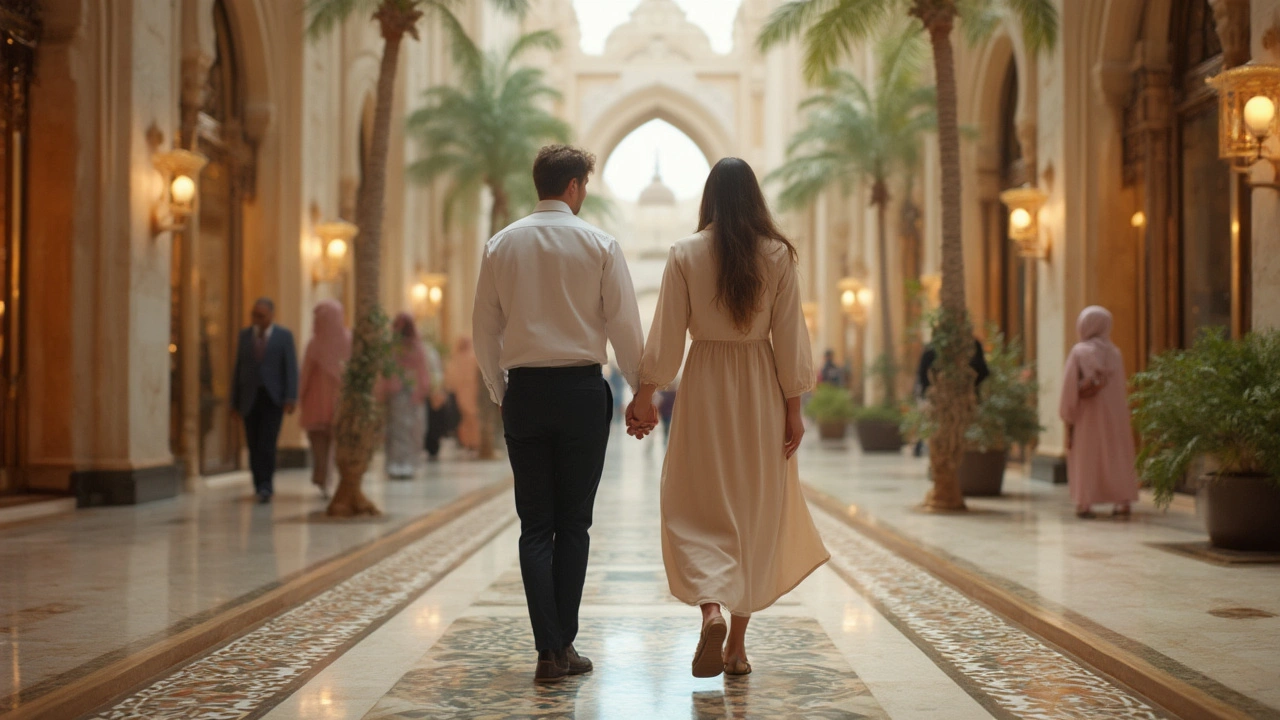Imagine strolling through one of the world’s most exciting cities, only to freeze mid-step, wondering if you can simply reach for your partner’s hand. That tiny gesture you don’t even think about back home? In Dubai, it takes on a whole new meaning. Stories spin around in travel forums and whisper through Whatsapp groups: can you really get into trouble for holding hands with your wife in Dubai? Or is it one of those overblown travel myths? And if you accidentally mess up, what’s the worst that can actually happen?
What Dubai’s Laws and Social Codes Actually Say
Dubai runs on contrasts. Skyscrapers in the clouds, glittering malls, ultra-modern everything—yet the core of society still leans deeply into tradition. The United Arab Emirates uses a blend of Islamic law (Sharia) and civil legislature, meaning daily life straddles modernity and conservatism. Now, about the main question: Is it illegal to hold hands with your wife in Dubai?
The short answer: holding hands between married couples isn’t outright forbidden. Dubai’s official government portals, like Visit Dubai and Dubai Police, clarify that mild forms of affection—think hand-holding—are generally tolerated if you’re legally married. But passionate displays such as kissing, hugging, and cuddling cross the line, and these can get you fined, warned, or even temporarily detained. This isn’t just internet hearsay; between 2010 and 2018, at least a dozen international couples ended up in hot water after public displays of affection, according to reports published by The National and Gulf News.
What about unmarried couples? That’s where Dubai turns especially strict. If you’re not married, even mild touching can bring trouble, though the police rarely patrol with the sole purpose of enforcing PDA laws. As for LGBTQ+ couples—laws are even tougher, and any public affection should absolutely be avoided due to real legal risks. Dubai’s society also watches closely: even if a police officer doesn’t scold you, a passerby might report you. Dubai is home to nearly 90% expats, but the local customs shape public spaces, and there are always eyes.
This doesn’t mean locals walk around policing handshakes or brushing off old-fashioned norms left and right. You’ll spot some local couples quietly holding hands—mainly older, married pairs. But it’s never flashy. Younger Emiratis, out of respect, tend to walk side by side, sometimes leaving a breezy foot or two between them. Here’s a telling stat: a survey from the UAE-based research firm YouGov found that only about 17% of residents believed kissing in public is ever acceptable, with hand-holding being much less controversial—about 55% said they didn’t mind.
Dubai’s official tourism board recommends “modest conduct in public,” especially in family areas, shopping malls, government buildings, and all forms of public transport. People do get away with hand-holding in tourist hubs, hotel grounds, and theme parks—but it’s always safer to stay subtle. Often, you’ll see plenty of travelers from Western backgrounds innocently holding hands, but rarely anything more. When in doubt: imagine your grandma is watching.
| Gesture | Acceptability in Dubai | Enforcement Risk | Notes |
|---|---|---|---|
| Holding hands (married) | Usually tolerated | Low | Be discreet in public |
| Holding hands (unmarried) | Technically not allowed | Moderate | Risk increases in conservative areas |
| Kissing/hugging in public | Forbidden | High | Offenders risk fines or detention |
| LGBTQ+ affection | Strictly forbidden | Very high | Real legal danger; avoid at all costs |

Where, When, and How: Practical Tips for Couples
The practical side isn’t just about avoiding fines—it’s about blending in, staying respectful, and keeping your travel experience hassle-free. Start with dress. If the goal is respect, modest attire helps. This means covered shoulders and knees, avoiding skin-tight clothes, and opting for lightweight fabrics to beat the heat. It’s not just about fashion—it’s the first thing people notice.
When it comes to holding hands, location makes all the difference. You’re far more likely to be left alone poolside at a five-star hotel or wandering through tourist hotspots like the Dubai Mall, Jumeirah Beach Residence, or Global Village. In private resorts and international restaurants, the mood’s relaxed and so are the rules—staff and patrons are used to diverse cultures, especially in tourist zones. But in more local areas or during Ramadan, even a simple hand-hold might be pushing your luck. Ramadan especially amps up social conservatism. The city’s energy changes and authorities up reminders for visitors to “respect local values.”
Here’s another thing few guidebooks mention: who’s around you matters a lot. In the family-friendly zones, you’ll encounter everything from strollers to teenagers on field trips and elderly folks going for strolls. If you notice everyone keeping a bit of distance, follow suit. Blend in and you avoid stares—no one wants to be the reason for a crowd’s disapproval. Even among young Emiratis and expats, you’ll see more distance than you’d expect during daily life, but in Dubai Marina or City Walk, things can feel almost European at times—just skip anything more than hand-holding.
Getting from A to B? On public transport like Dubai Metro, buses, or trams, affection is a definite no-go. Announcements remind passengers to behave respectfully and, once again, security cameras are everywhere. This isn’t about paranoia, but Dubai prides itself on order, and rules do get enforced if someone complains. If you’re ever unsure, keep hands to yourself or look for local cues—if no one else is doing it, take the hint.
What if someone approaches you—a security guard, a mall manager, or a random concerned local—and asks you to stop? Apologize, don’t protest, and separate hands immediately. Even if you think it’s harsh, a respectful attitude diffuses situations in seconds. Real trouble usually starts when tourists get defensive or rude. Practically speaking, police usually issue a warning unless you’re repeatedly breaking the rules or getting into arguments. Fines can be up to AED 1,000 (about $270), and in rare cases detention is possible, but hardly anyone gets jail time simply for holding hands if they respond politely and stop.
Now, if you really want to prove you’re married, it doesn’t hurt to have a photo of your passport page or even a copy of your marriage certificate handy. It almost never comes up, but in the odd chance you’re stopped, having proof heads off confusion quickly. Note that Dubai legalized cohabitation for unmarried couples in 2021, but this doesn’t mean PDA laws disappeared. The rules are changing, but public spaces still reflect tradition. Also, travelling during peak tourist seasons (winter months from November to March) tends to be more relaxed; staff are used to waves of international visitors and tolerant attitudes prevail in tourist enclaves.

Why It Matters: Dubai’s Unique Blend of Modernity and Tradition
The question goes deeper than travel etiquette. See, Dubai’s global image sparkles with futuristic architecture, fashion runways, and glamorous nightlife, but the foundation stays rooted in centuries-old customs. This balancing act is why the rules seem blurry—what’s normal in Paris or Los Angeles could get you a side-eye (or more) in Dubai. The city tries to please the world without losing its soul.
For some, these norms seem stifling. But for Emiratis, public order—and respect for privacy—are deeply valued. Family is at the core of life, and public spaces echo these priorities. Even local pop culture covers this topic: Emirati forums buzz with debates every Valentine’s Day, and there’s always that one story of tourists who went too far but didn’t do their research. It’s not about cramping your style, but reflecting a different worldview. An Emirates-based etiquette coach, Ayesha Al Mansoori, put it like this in a 2023 interview: "Everyone is welcome, but being a gracious guest means respecting the house rules."
Dubai has made huge changes over the past decade, especially as it preps for world events and bigger tourism numbers—Expo 2020 was a gigantic example. In the runup, law tweaks softened penalties for things like cohabitation and alcohol, but PDA is a different animal. Tourists may find the blend odd—where else can you catch the world’s largest fountain display, zip across the desert in a Ferrari, and then cautiously avoid touching your spouse’s hand on the metro? But that’s what keeps Dubai unique. Even as progress rushes in, tradition isn’t just window dressing. It’s stitched into daily life.
If you’re planning your trip, remember: being informed is key. If a gentle reminder bumps up against your Western idea of romance, just smile and move on. Relationships thrive in private—hotel rooms, private beaches, luxury suites—just not front and center at the local souk. Embracing this balance doesn’t mean sacrificing your relationship or even your fun; it just means living a little more thoughtfully for the duration of your stay. Isn’t that worth the price of admission?
If you’re someone who craves experience over argument, skip the stubbornness and enjoy what Dubai does better than almost anywhere: luxury hotels, mind-blowing malls, wild nights out—no one’s watching what you do once you’re behind closed doors. Out in public, grasp your partner’s fingers with subtlety and confidence—but leave the grand gestures for when no one’s looking. The city notices, and so do the people around you. Blending respect with adventure is the fastest way to make your Dubai memories all the sweeter.
So, can you hold hands with your wife in Dubai? Yes — discreetly, and with a little cultural awareness, you’re all set for an amazing trip. Just don’t try to rewrite the city’s rules. Embrace the dance between modern cool and old tradition – it’s the Dubai way.
